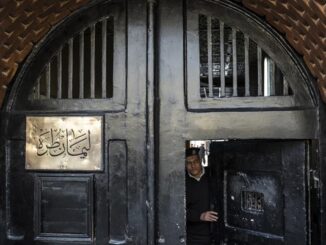
The General Authority for Supply Commodities (GASC), Egypt’s state grain buyer, bought 350k tons of wheat from France, Russia, and Bulgaria in its first concluded tender since war broke out in Europe’s breadbasket, Bloomberg reported.
The latest wheat tender of the top wheat buyer, Egypt, shows the huge cost of buying grain, as the top grain buyer booked wheat at a very high price in latest tender.
The average price (accounting for freight) stood at nearly USD 490 per ton — the highest in nearly six years, and up by around half what GASC paid in its last international purchase in mid-February
“The top wheat buyer Egypt’s latest purchase laid bare the eye-watering costs importers face as the Ukraine war upends the global grains trade,” the report says.
The country, Egypt, is boosting efforts to ensure it has enough to feed its citizens, many of whom rely on a bread-subsidy program.
In a tender on Wednesday, it drew offers from six companies, about half the normal number, traders who asked not to be identified said. The state-run buyer ultimately scooped up 350,000 tons, including French wheat, a rare Bulgarian cargo and one from Russia.
That came at a high price: The amount booked averaged almost $490 a ton after factoring in freight. That’s up a whopping 44% from the rate paid in mid-February, just before the war erupted, and the most in at least six years.
The large volume purchased, even at high prices, highlights Egypt’s urgency to build reserves, said Matt Ammermann, a commodity risk manager at StoneX.

Egypt’s cabinet recently cited wheat stockpiles as sufficient for just two and a half months, although its own harvest is now underway and could shore up supply.
The country was forced to cancel its last two tenders as the war shut Ukraine’s ports and spooked traders from offering Russian cargoes.
Paris wheat futures rose as much as 2.6% to 409.50 euros ($445) a ton on Wednesday, nearing an all-time high.
Many nations in the Middle East and North Africa greatly depend on Black Sea grain, leaving their food supplies particularly vulnerable from the war.
Soaring food costs have put people’s resilience there at a “breaking point,” according to the United Nations’ World Food Program. And it comes just as the Muslim world marks Ramadan.
Russia has continued to ship grain to Egypt since the war began, with the country ranking among its leading destinations in March. Russian wheat has traditionally dominated sales in Egyptian tenders.
50% above pre-war prices
The Egyptian officials say they knew that wheat purchases would be pricier — but not at that level.
The government in early March said rising wheat prices would cost it an additional EGP 15 bn this fiscal year, penciling the cost in at USD 350 per ton. However, the Paris wheat futures rose to close near an all-time high of USD 445 per ton Wednesday.
A different tack to secure supply: This was GASC’s first limited tender in years, with offers only open to European nations among the 16 countries accredited to supply the country.
Six European companies made offers, Bloomberg says, citing unnamed traders — around half the number GASC is accustomed to receiving in normal circumstances.
France had pledged to “stand by Egypt” on wheat and make sure Egyptians get what they need, leading the purchases.
GASC also secured one shipment of Russian wheat — which is less surprising than one might think given that Russian supply to private and public buyers has continued uninterrupted (and even grown) since the war began. Bulgaria also sold us a single cargo.
The grain is supposed to be shipped in late May or the first half of June.
The tender was a test of the wartime wheat market. GASC put tenders on hold in early March after being forced to cancel two in a row, as the war blocked Ukrainian exports and sent ins. and shipping costs skyrocketing, upending the global market.
Egypt typically sources more than 80% of its wheat imports from Russia and Ukraine.
However, GASC is working on diversifying its options after reserves dipped, having recently held talks with India, Argentina, France and the United States on potential supply.
Egypt had about 2.6 months of wheat on hand as of last week, down from the four-month figure the government announced in early March.
In this regard, the government remains focused on the local harvest. It plans to spend around EGP 36 bn to purchase 6 million tons of local wheat this year, roughly doubling its purchase budget from last year.
Purchase outside tenders
The Egyptian government currently only books cargoes via tenders, but it plans to soon let companies also submit offers directly
Egypt’s government plans to soon allow buying wheat outside of tenders as the biggest importer of the grain seeks more ways to secure supplies amid disruption from the war in Ukraine.
The government currently only books cargoes via tenders and typically mostly from Black Sea countries like Russia and Ukraine, where flows have been upended by the war.
It now wants to let companies to also be able to submit offers directly to the Supply Ministry, said people familiar with the matter who asked not to be identified because they’re not authorized to speak to media.
IMF talks
In a similar context, the International Monetary Fund (IMF) is supposed to hold debt discussions with Egypt, Sri lanka and Tunisia, with respect to obtaining new loans, mainly to meet the cost of debt servicing and partly to cover the post-war extra costs, at least in the case of Egypt.
However, all the three countries are already in various stages of talks for IMF support.
The International Monetary Fund will sit down with Sri Lanka, Egypt and Tunisia to discuss steps that need to be taken to help them as tighter financial conditions raise the cost of debt servicing, the institution’s chief said.
“The good news is that we see debt, we follow it, and we are already zeroing in on countries that are in need of debt restructuring,” IMF Managing Director Kristalina Georgieva said in an interview with Tom Keene on Bloomberg Television on Thursday, adding “We have to press for debt restructuring”.



